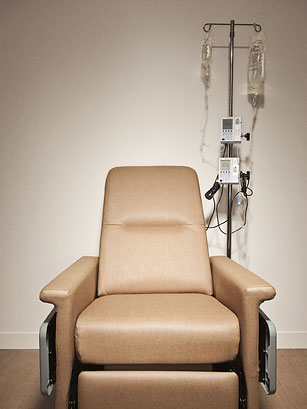
Patients who decline chemotherapy are often fearful of the side effects
(2 of 3)
A Numbers Game
While it's tempting to argue that refusenik patients are allowing irrational fears about side effects to get in the way of medical deliberation, they may actually be grappling with a different calculation that too often gets ignored: The therapies might prolong life, but for how long, and at what cost? There have been no methodological studies — withholding treatment from a control group would be unethical — but one survey comparing almost 800 patients who refused all conventional cancer treatment with those who accepted treatment found that refusal shortened the median length of survival by nine months. The survey was extremely broad: subjects suffered from 30 kinds of cancer at varying stages of the disease, and survival ranged from two months to more than six years. But the point is, sometimes treatment buys you a lot of time. Sometimes it doesn't.
Even if the implications of the study were more precise than they are, the numbers still wouldn't tell the whole story. "Survival is easy to measure, but what we don't measure is how people live during the time they are alive, " says Velanovich. "The bitter truth is that none of us knows when our last days are going to be. What you can control is how you choose to live during the time that you are alive." People who refuse treatment have in some ways already come to terms with this existential dilemma.
The Patient's Voice
It used to be that doctors made the treatment decisions and expected their patients to fall in line. That has all changed over the past several decades. In 1975 the ACLU published a model patient's bill of rights, which stated that "an adult patient who is both conscious and mentally competent has the legal right to refuse to allow any medical and surgical procedure to be performed on his body." In 1978, when the World Medical Assembly convened to hammer out the principles of informed consent, a patient's option of refusal was implicit within the requirement that doctors fully explain the risks and benefits of any particular treatment.
Still, people who eschewed what medicine had to offer were seen as problem patients or, worse, mentally unstable — in the grip of "false beliefs" that it was the doctor's unfortunate duty to try to change. In 1982 in the journal Psychotherapy and Psychosomatics, a psychiatrist at Brown University declared that "most situations involving refusal of treatment involve issues of psychological distortions, interpersonal dysfunction, medical systems dysfunction, or psychiatric disorder, such as depression or organic mental disorder." Nowhere was it considered that a rational patient might be making an informed choice.
It wasn't until 1990 that the Association of American Physicians & Surgeons adopted a list of freedoms that should be guaranteed to all patients that included the freedom "to refuse medical treatment even if it is recommended by their physician." It fell to the psychologists specializing in cancer treatment in the emerging field of psycho-oncology to try to make sense of why, and under what circumstances, a cancer patient would choose to exercise that newly defined right. What they have found has contradicted the stereotypes of uninformed, irrational and suicidal patients.
"They made quite deliberate and usually clearly reasoned decisions," says Irena Madjar of the University of Auckland, who conducted a survey of such patients that was published in 2005 in the European Journal of Palliative Care. "We found them to be intelligent, quite articulate and fully aware of the possible consequences of their decisions. They are not a minuscule fringe group, but they need to be better understood and given more appropriate care."
One thing Madjar and others like her are beginning to understand is that refuseniks don't use medical evidence as the only or even the main factor in their decisionmaking, although they report collecting lots of research about proposed treatments. But they then go further, making choices that are more reflective of their values, like the belief that the meaning of life is greatly diminished when the ability to live it normally is compromised. They don't want to live as long as possible if that means a loss of bodily integrity and personal agency and a heavy dependence on others. Sometimes they rely on the personal experiences of friends who underwent similar treatments. They believe in the benevolence of the doctor's intentions and often in the doctor's skill as well, but in the end, they choose a route that they think will give them a better sense of control, quality of life and dignity.